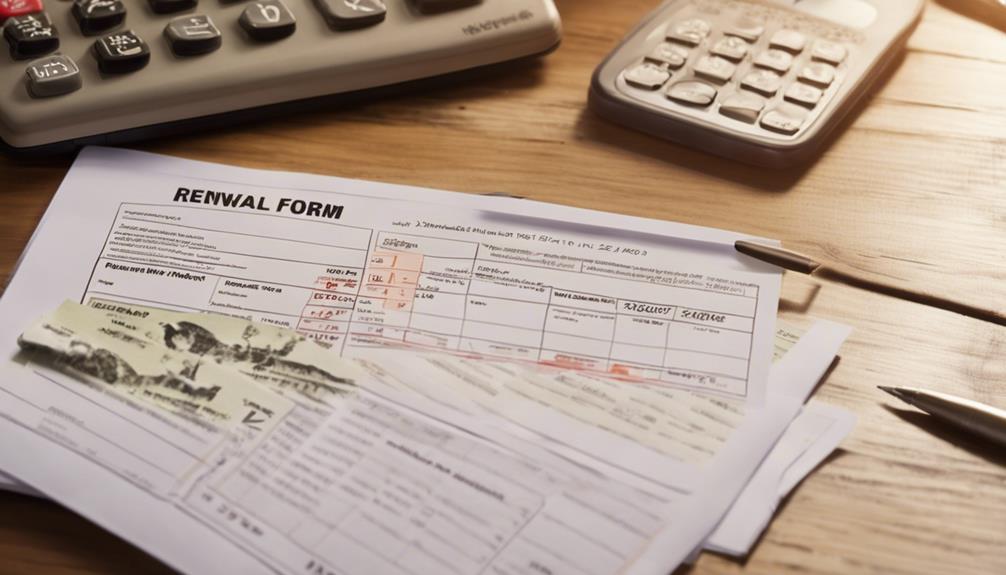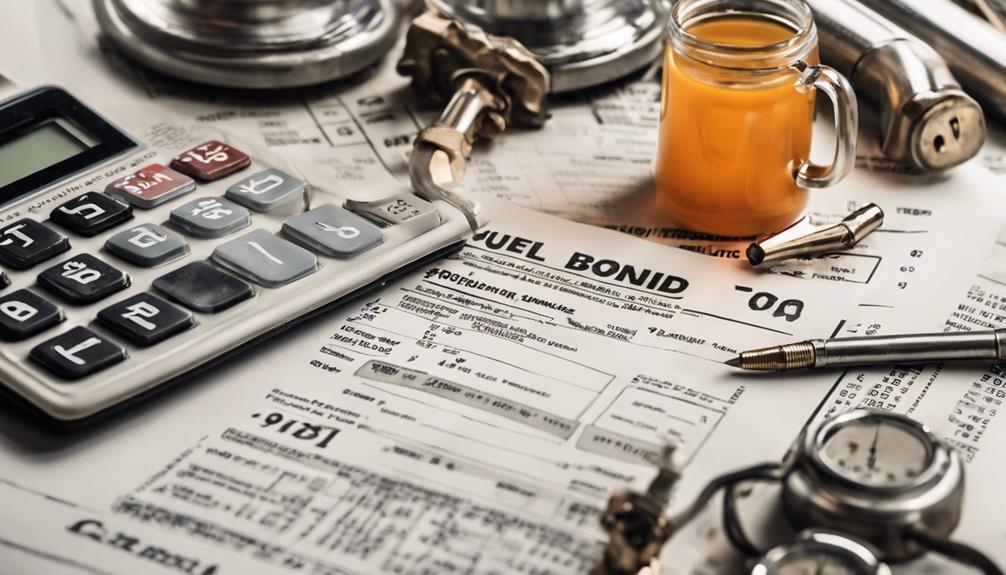When you're navigating the fuel distribution landscape in Wisconsin, understanding the Fuel Tax Bond is crucial. This bond not only protects the state from potential tax liabilities but also enhances your business's credibility in a competitive market. If you're starting a new venture or looking to expand, you might wonder about the specific requirements and implications of this bond. What exactly do you need to know to ensure compliance and safeguard your operations? The answers could significantly impact your business strategy moving forward.
What Is a Fuel Tax Bond?

A fuel tax bond serves as a financial guarantee that ensures businesses comply with state and federal fuel tax regulations. Essentially, it's a type of surety bond that protects the government against potential tax defaults by fuel suppliers, distributors, and retailers.
Fuel tax bonds provide financial guarantees for tax payments, ensuring businesses operate legally within state regulations. When you obtain a fuel tax bond, you're promising that you'll adhere to all tax obligations related to fuel sales and use.
To get a fuel tax bond, you'll typically need to apply through a surety company. They'll evaluate your financial stability and creditworthiness, which affects the bond amount and premium you'll pay.
If you fail to meet your tax obligations, the government can make a claim against your bond to cover any unpaid taxes or penalties.
It's crucial to understand that a fuel tax bond isn't an insurance policy. Instead, it's a safeguard for the government, ensuring that you fulfill your fiscal responsibilities.
If a claim is made, you'll be required to reimburse the surety for any amount paid out. By securing this bond, you demonstrate your commitment to conducting business ethically and legally in the fuel industry.
Importance of Fuel Tax Bonds
Understanding the importance of fuel tax bonds is essential for anyone operating in the fuel industry, as these bonds not only protect government interests but also enhance your business's credibility. By securing a fuel tax bond, you demonstrate your commitment to complying with tax regulations and fulfilling your financial obligations. This assurance can make a significant difference when establishing relationships with suppliers, customers, and regulatory authorities.
In a similar manner to cigarette tax bonds, which secure state revenues, fuel tax bonds provide a financial guarantee that you'll meet your tax responsibilities.
Moreover, fuel tax bonds safeguard against potential tax evasion, ensuring that you're held accountable for the taxes owed on fuel sales. When you have a bond in place, it acts as a financial safety net for the government, giving them confidence that they'll collect owed taxes, even if you encounter financial difficulties. This can prevent costly legal disputes and penalties that could arise from non-compliance.
Additionally, having a fuel tax bond can open doors to better business opportunities. Many clients prefer working with bonded operators, as it reflects reliability and professionalism.
Ultimately, fuel tax bonds not only help you stay compliant but also strengthen your business reputation in a competitive market. Investing in a bond is a smart step towards long-term success in the fuel industry.
Who Needs a Fuel Tax Bond?

Fuel tax bonds are essential for various stakeholders in the fuel industry. If you're a fuel distributor, retailer, or supplier, you likely need a fuel tax bond to operate legally and comply with state regulations.
These bonds act as a financial guarantee that you'll pay the necessary fuel taxes, protecting the state and consumers from potential losses. Furthermore, similar to the mileage tax bond requirements, these bonds ensure that businesses maintain compliance with tax obligations and regulations.
If you're involved in selling fuel, you also fall under the category of those who need a fuel tax bond. By securing this bond, you demonstrate your commitment to adhering to tax obligations, which can enhance your business reputation and credibility.
Additionally, if you're a commercial carrier transporting fuel, you may need a bond to ensure that you're in compliance with transportation regulations.
Even if you're a new business entering the fuel market, you'll find that obtaining a fuel tax bond is a key step in establishing your operations. Without it, you may face fines, penalties, or even a halt in your business activities.
Types of Fuel Tax Bonds
What types of fuel tax bonds do you need to know about? There are primarily two categories: the general fuel tax bond and the alternative fuel tax bond.
The general fuel tax bond is required for businesses that distribute or sell traditional fuels like gasoline and diesel. This bond guarantees that you'll pay your fuel taxes and comply with state regulations. If you fail to do so, the bond provides a safety net for the state, covering any unpaid taxes.
On the other hand, the alternative fuel tax bond is specific to those dealing with alternative fuels, such as biodiesel or compressed natural gas. This bond ensures that you'll adhere to the unique regulations surrounding these fuels, including specific tax obligations.
Both types of bonds serve as a financial guarantee to the state, protecting it from losses due to non-compliance.
When you apply for a fuel tax bond, it's crucial to identify which one you need based on your business activities. Choosing the correct bond not only helps you stay compliant but also safeguards your operations against potential penalties.
How to Obtain a Fuel Tax Bond

Securing a fuel tax bond is a straightforward process that involves several key steps.
First, you'll need to gather the necessary documentation. This typically includes your business information, tax identification number, and any state-specific forms required for your application.
Next, reach out to a surety bond provider. It's crucial to choose a reputable company that specializes in fuel tax bonds. They'll guide you through the application process and provide insight into what's required.
Once you've submitted your application, the surety will assess your financial stability and creditworthiness.
If approved, you'll receive a quote for the bond premium. After that, you'll need to review and sign the bond agreement.
Once everything's in order, you'll pay the premium, and the bond will be issued.
Costs Associated With Fuel Tax Bonds
Often, businesses overlook the various costs associated with obtaining a fuel tax bond. First, you'll need to consider the premium you'll pay for the bond itself. This premium typically ranges from 1% to 15% of the total bond amount, depending on factors like your credit score and business history. If your credit score is lower, expect to pay more.
Additionally, there may be underwriting fees charged by the bonding company. These fees can vary widely, so it's crucial to shop around for the best deal.
Don't forget to factor in any required documentation or application fees that can add to your initial costs.
You might also incur costs related to maintaining your bond, such as annual renewal fees, which can vary based on the bonding company's policies. It's important to keep these in mind as they can impact your overall budget.
Lastly, consider any potential legal or compliance fees. If you run into issues with your bond, resolving them could require legal assistance, which can be an unexpected expense.
Renewal Process for Fuel Tax Bonds

When it's time to renew your fuel tax bond, you'll want to start the process well in advance to avoid any lapses in coverage. Typically, you'll receive a notification from your bonding company a month or so before your bond expires. Review this communication carefully and gather any necessary documents such as your financial statements or proof of compliance with state regulations.
Next, contact your bonding agent to discuss your renewal options. They may require updated information about your business operations or changes in your financial status. Be prepared to answer questions and provide additional documentation if needed.
Once you've submitted everything required, your agent will evaluate your application and determine the premium for the renewed bond. It's wise to compare rates from different bonding companies to ensure you're getting the best deal.
After your bond is approved, you'll receive a copy of the renewed bond. Keep this document on file, as you may need it for inspections or audits.
Consequences of Not Having One
Operating without a fuel tax bond can lead to severe consequences for your business. First and foremost, you risk hefty fines and penalties from state authorities. Without the bond, you're non-compliant with regulations, which can result in your business being shut down or suspended. This not only halts operations but also impacts your revenue.
Additionally, the lack of a fuel tax bond can damage your reputation. Clients and partners may view your business as unreliable or untrustworthy. This perception can lead to lost contracts and weakened relationships within your industry. You might also face difficulty in securing future bonds or licenses, as potential surety providers may see you as a high-risk applicant.
Moreover, you could encounter legal issues. State agencies have the authority to take legal action against businesses without a fuel tax bond, which can lead to costly litigation. These legal battles can drain your resources, both financially and in terms of time.
Ultimately, the absence of a fuel tax bond not only jeopardizes your compliance but can have lasting effects on your business's viability and growth. Don't underestimate the importance of securing one.
Frequently Asked Questions About Fuel Tax Bonds

Understanding fuel tax bonds can help you avoid the pitfalls mentioned earlier. You might've questions about what a fuel tax bond is and why you need one. Essentially, it's a guarantee that you'll pay your fuel taxes on time. If you don't, the bond ensures the state can collect the owed amount.
You may wonder how much a fuel tax bond costs. The premium typically ranges from 1% to 10% of the total bond amount, depending on your creditworthiness. It's crucial to shop around for the best rates.
Another common question is how long the bond lasts. Generally, fuel tax bonds remain active until you cancel them or the state releases you from the obligation. Make sure to maintain compliance with your tax obligations to avoid bond claims.
If you're concerned about the application process, it usually requires providing some financial information and possibly a credit check.
Lastly, if you're looking for a provider, check for licensed and reputable surety companies. They can guide you through the process and answer any additional questions you may have, ensuring you stay compliant and avoid unnecessary penalties.
Conclusion
In conclusion, a Fuel Tax Bond is crucial for your business in Wisconsin's fuel industry. It not only ensures compliance with state regulations but also builds trust with customers and the state. By understanding the importance and process of obtaining this bond, you can protect your business from potential penalties and enhance your credibility. Don't overlook this essential step—securing a Fuel Tax Bond sets you on the right path for success in the competitive fuel market.

